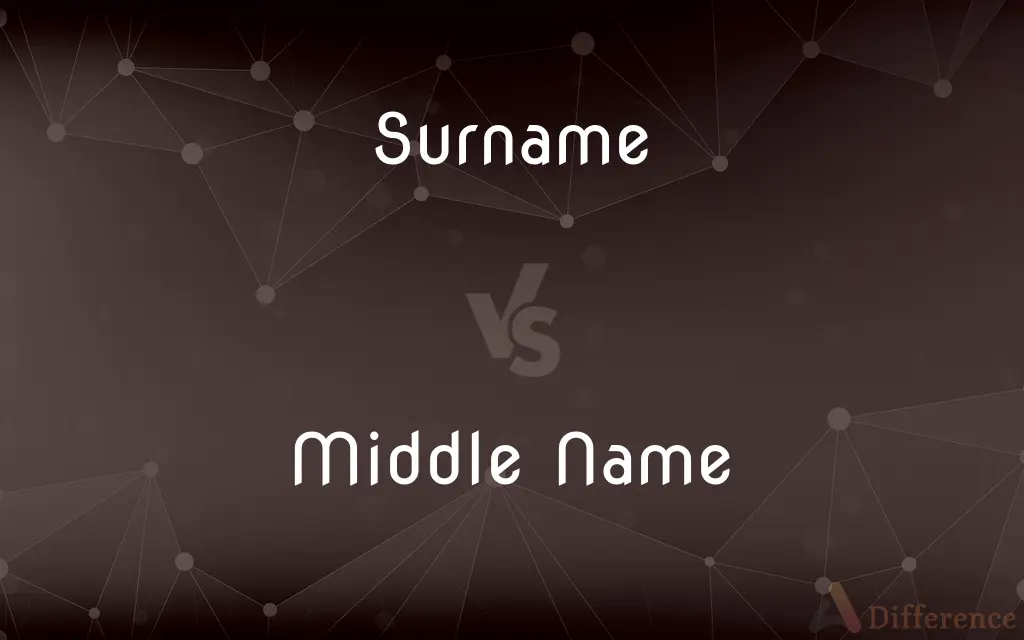Surname vs. Middle Name — What's the Difference?
By Tayyaba Rehman — Published on October 4, 2023
A surname is the family name shared by members of the same family, while a middle name is an additional name given to an individual, placed between the first and surname. Both are parts of one's legal identity.

Difference Between Surname and Middle Name
Table of Contents
ADVERTISEMENT
Key Differences
A surname, positioned as the last name in a person's full name, is a hereditary family name common to all members of a family, whereas a middle name is an extra name assigned to a person, usually positioned between the first and the surname. The usage of surnames is almost universal, serving as a key identifier of family lineage or ancestral line, while the incorporation of a middle name can vary, and its use is not universal across cultures.
Surnames hold significant importance, being passed down through generations, usually from the paternal line, and middle names allow for individual differentiation, sometimes serving to honor relatives or carry familial significance. It is customary to inherit the surname from one’s parents, preserving familial ties and ancestry, and the middle name is often chosen by parents, sometimes reflecting heritage, values, or individual meaning.
When it comes to usage, the surname is frequently used in formal and informal contexts to address or refer to an individual, and the middle name is typically used less frequently, often appearing mainly in formal documents or occasions. Surnames serve as a primary means of identification in societal contexts, helping in distinguishing individuals with common first names, while middle names might rarely be used or known outside of official documents and are generally optional in many cultures.
While surnames and middle names are both components of an individual's identity, surnames generally carry more weight in terms of legal importance and societal recognition, whereas middle names are often considered less crucial and may even be omitted in everyday use. Surnames are often mandatory in legal documents, signifying familial lineage and heritage, and middle names, being optional, might not hold as much legal importance and are often skipped in everyday interactions and introductions.
Comparison Chart
Position in Name
Last
Between First and Last Name
ADVERTISEMENT
Hereditary
Yes
No
Usage Frequency
Common in both formal and informal contexts
Mostly in formal documents or occasions
Legal Importance
High
Lesser
Universality
Almost Universal
Varies, not universal across cultures
Compare with Definitions
Surname
A surname typically appears as the last name in a person's full identity.
The registration form asks for your first name and surname.
Middle Name
Middle names are often used to honor relatives or reflect familial heritage.
He was given the middle name James after his grandfather.
Surname
Surnames usually hold significant societal and familial value.
Her surname reflects her family's long-standing heritage.
Middle Name
The middle name is typically less frequently used in daily conversation and documentation.
Most of his friends do not know his middle name, Andrew.
Surname
The surname is commonly used to address or refer to an individual.
We call our teacher by her surname, Mrs. Thompson.
Middle Name
Middle names can add a level of individual differentiation within families sharing the same surname.
His middle name, William, differentiates him from his father.
Surname
A surname is a family name that is shared by family members.
Smith is a common surname in the United States.
Middle Name
A middle name is an additional name given to an individual, placed between the first and last name.
Her middle name, Rose, suits her personality.
Surname
A name shared in common to identify the members of a family, as distinguished from each member's given name. Also called family name, last name.
Middle Name
Middle names are usually optional and can be omitted in many contexts.
She prefers not to use her middle name, Marie, in professional settings.
Surname
A nickname or epithet added to a person's name.
Surname
To give a surname to.
Surname
(obsolete) An additional name, particularly those derived from a birthplace, quality, or achievement; an epithet.
Surname
(obsolete) An additional name given to a person, place, or thing; a byname or nickname.
Surname
The name a person shares with other members of that person's family, distinguished from that person's given name or names; a family name.
James is my first name, and Smith is my surname.
Surname
(Classical studies) The cognomen of Roman names.
Surname
A clan.
Surname
(transitive) To give a surname to.
Surname
(transitive) To call by a surname.
Surname
A name or appellation which is added to, or over and above, the baptismal or Christian name, and becomes a family name.
Surname
An appellation added to the original name; an agnomen.
Surname
To name or call by an appellation added to the original name; to give a surname to.
Another shall subscribe with his hand unto the Lord, and surname himself by the name of Israel.
And Simon he surnamed Peter.
Surname
The name used to identify the members of a family (as distinguished from each member's given name)
Surname
The surname is usually inherited and passed down through generations.
He carries the surname of his forefathers with pride.
Common Curiosities
How often is the surname used in daily life?
Surnames are commonly used in both formal and informal contexts to address or refer to individuals.
What is a surname?
A surname is the family name shared by members of a family, typically inherited from parents.
Can a middle name have familial significance?
Yes, middle names often have familial significance and can be used to honor relatives or reflect heritage.
Is the surname used in addressing people?
Yes, the surname is commonly used to address or refer to individuals, especially in formal contexts.
Is a middle name mandatory?
No, middle names are usually optional and can be omitted in many cultures and contexts.
How often is the middle name used in daily life?
Middle names are used less frequently, typically appearing mainly in formal documents or occasions.
Where does the surname appear in the full name?
The surname typically appears as the last name in a person’s full name.
Is a surname mandatory?
Yes, surnames are generally mandatory and have high legal importance.
What is a middle name?
A middle name is an additional name given to an individual, usually placed between the first and last name.
Does the surname have familial significance?
Absolutely, surnames are significant indicators of family lineage and heritage.
Can a person have more than one surname?
Yes, in some cultures, it’s common to have more than one surname, often hyphenated or listed sequentially.
Is the middle name used in addressing people?
Typically, the middle name is not used in addressing people in everyday conversation.
Can a middle name be legally changed?
Yes, like any part of a legal name, middle names can typically be changed through a legal process.
Where does the middle name appear in the full name?
The middle name is usually positioned between the first and the last name.
Can a person have more than one middle name?
Yes, it is possible for a person to have more than one middle name.
Share Your Discovery

Previous Comparison
Petition vs. Plea
Next Comparison
Glass Ceiling vs. Concrete CeilingAuthor Spotlight
Written by
Tayyaba RehmanTayyaba Rehman is a distinguished writer, currently serving as a primary contributor to askdifference.com. As a researcher in semantics and etymology, Tayyaba's passion for the complexity of languages and their distinctions has found a perfect home on the platform. Tayyaba delves into the intricacies of language, distinguishing between commonly confused words and phrases, thereby providing clarity for readers worldwide.












































